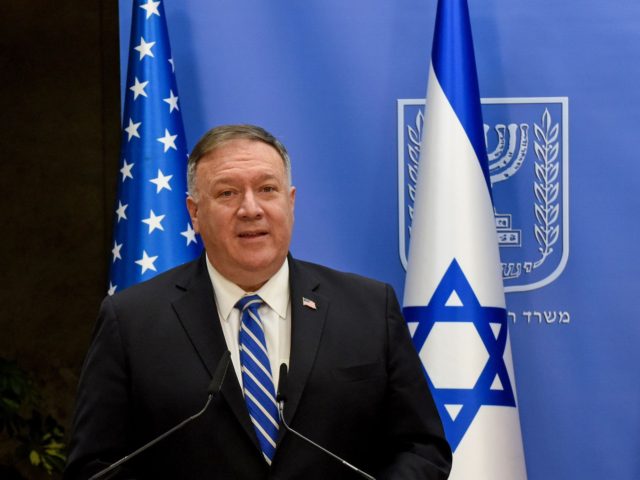U.S. Secretary of State Mike Pompeo expressed his hope Monday that Iran would follow in the United Arab Emirates’ footsteps and establish diplomatic ties with Israel.
“I hope one day that the Iranians will normalize with Israel as well,” Pompeo told The Jerusalem Post while on a brief visit to the country.
“I have every expectation that the world will come to see Israel as the rightful Jewish homeland, and that it is going to be here. So, I leave no country out from my commitment to my core belief that one day the world will recognize that this is the right thing to do for their country – and I would include Iran in that as well.”
Pompeo’s visit to Jerusalem marked the beginning of a five-day tour in the region, with stops in Sudan, Bahrain, and Abu Dhabi. According to U.S. officials, he may also stop in Oman and Qatar.
Pompeo met with Prime Minister Benjamin Netanyahu, Defense Minister Benny Gantz and Foreign Minister Gabi Ashkenazi to discuss the UAE deal and possible normalization accords with other Arab nations. He told the Post:
I couldn’t tell you the timing and I couldn’t tell you which countries, but I think as other nations around the world come to see that there is enormous benefit to the relationship – from a diplomatic perspective, an economic perspective, and from a security perspective – I think that other nations will see that it is the right thing to do.
I think they will also come to see that building out this set of relationships is the pathway that will lead to stability in the Middle East as well.
In return for the diplomatic ties with the UAE, the U.S. requested Netanyahu suspend his plans to apply sovereignty over parts of the West Bank.
Pompeo told the Post the length of Israel’s commitment not to annex would have “better clarity” when Netanyahu and Crown Prince Mohammed Bin Zayed met with President Donald Trump to sign the treaty in the coming weeks.
“I’ll leave it to those three leaders to discuss,” he said. “The commitment that the Israelis made was that they would not extend their sovereignty for a period of time. We are hopeful that the leaders will all be physically together, and will probably have greater clarity and the ability to answer that more clearly.”
Pompeo would not answer directly whether he believed Saudi Arabia would eventually normalize ties with Israel.
“I think the world turns that way. So it is not worth making any prediction. But I think that as time goes on, there is a clarity that this Jewish nation and these nations that are Arab states, will find that acknowledging that Israel does exist and shall exist is something that they will find their way to as well,” he said.
During a joint press briefing on Monday with Netanyahu, Pompeo said that while the U.S. would remain committed to preserving Israel’s qualitative military edge in the region, it may provide the United Arab Emirates with weapons at a future date.
The UAE, among the world’s biggest defense spenders, has voiced its desire to purchase F-35 fighter jets but a pledge made by the U.S. after the 1973 Yom Kippur War to preserve Israel’s “qualitative military edge” in the region has prevented it from doing so until now.
“The US has, and I am confident always will, remain committed to Israel’s security and the issues of QME remain statutory and are a legal requirement in the US,” he told the Post, adding the U.S. has also sold advanced weapon systems to the UAE for more than 20 years “to help keep them safe and secure.”
“We have an obligation to try and do our best to make sure they [the UAE Y.K.] have the weapon systems that they need,” he continued. “They face a real threat just like Israel does from the Islamic Republic of Iran. We have sold them Patriot missiles and we have sold them other equipment. The fact that they have now recognized Israel, gives us another chance to go reevaluate and see what’s appropriate, how do we do that and we are committed to doing that and we will.”
He added the benefits of the UAE deal included intelligence sharing as well as a mechanism for seeing President Donald Trump’s peace proposal to fruition.
“There’s lots of pieces to this that we now will have the opportunity in ways that we couldn’t before but we are committed to maintaining [Israel’s] security,” he said.
“None of it precludes the Palestinians observing that the Israelis are prepared to have this conversation, are prepared to negotiate and that our vision for peace provides a reasonable basis on which to begin that set of conversations,” he said. “It’s no longer the case that the Palestinians are going to be able to exercise a veto on the rationalization of the relationship and the normalization of the relationship between Israel and other countries.”

COMMENTS
Please let us know if you're having issues with commenting.